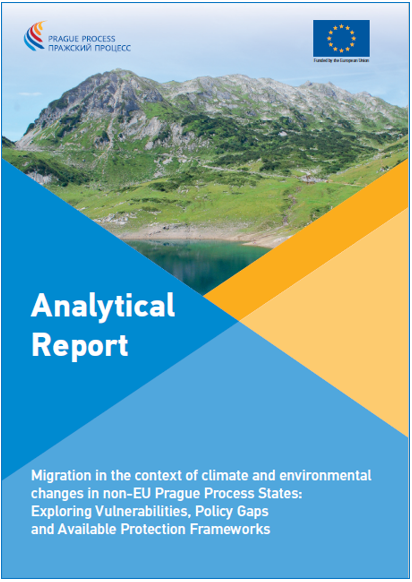This analytical report examines the political challenges and responses to migration driven by climate and environmental changes (MECC) across the non-EU Prague Process states (non-EU PPS). It offers evidence of cases substantiating the climate change-migration nexus and elaborates on the impact that climate change can have on migration movements. It investigates the role of the EU in supporting climate adaptation in non-EU PPS, while reflecting on the impact that latent and ongoing conflicts, often interrelated with water scarcity and mismanagement of (already scant) natural resources, may have in exacerbating climate vulnerability and migration movements. The report illustrates relevant national protection practices covering a wide range of people, both nationals and non-nationals, affected by climate and environmental factors. It also analyses the protection frameworks available to MECC at the national and international level.
Non-EU PPS are recommended to engage more at the supranational level to develop comprehensive and uniform policy responses addressing specific climate and environmental challenges forcing people out of their homes, as well as related protection needs. States should improve climate adaptation and mitigation actions in their internal and external policy dimensions and enhance regional cooperation on climate and environmental matters. Finally, they should consider developing or reinforcing concerted actions, regional cooperation, and transboundary water agreements to properly and fairly manage shared water resources, their use and distribution. This in turn would deepen regional integration, while avoiding the escalation of tensions or conflicts over natural resources.
Here are a few policy recommendations from the Analytical report:
- foster cooperation and partnership with the EU to achieve the climate goals agreed upon under the Paris Agreement;
- prioritize concerted actions, regional cooperation, and transboundary water agreements, which would deepen regional integration;
- develop or consolidate a regional cooperation framework to enhance environmental protection in the context of armed conflicts;
- strengthen regional cooperation on asylum and human rights matters.
For a deeper understanding and detailed policy recommendations, delve into the full publication
-> here in English and
-> here in Russian.
Our Repository contains the latest publications of the Migration Observatory and Training Academy of the Prague Process.
Subscribe to the Prague Process mailing list here in order to keep up to date with the latest developments outlined in our Quarterly Review.



